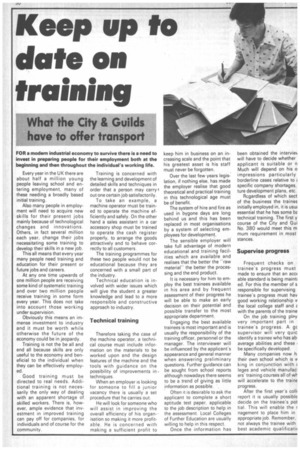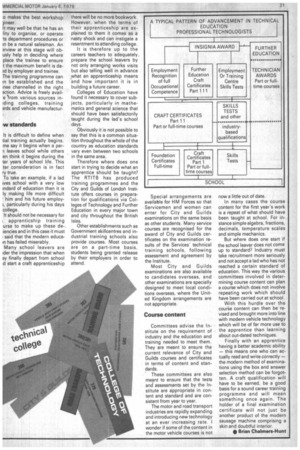Keep up to date on training
Page 32

Page 33

If you've noticed an error in this article please click here to report it so we can fix it.
What the City & Guilds
shave to offer transport
FOR a modern industrial economy to survive there is a need to invest in preparing people for their employment both at the beginning and then throughout the individual's working life.
Every year in the UK there are about half a million young people leaving school and entering employment, many of these needing a broadly based initial training.
Also many people in employment will need to acquire new skills for their present jobs mainly because of technological changes and innovations. Others, in fact several million each year, change their jobs necessitating some training to develop their skills in a new job.
This all means that every year many people need training and education for their present or future jobs and careers.
At any one time upwards of one million people are receiving some kind of systematic training and over two million people receive training in some form every year. This does not take into account those working under supervision.
Obviously this means an immense investment to industry and it must be worth while otherwise the future of the economy could be in jeopardy.
Training is not the be all and end all because skills are only useful to the economy and beneficial to the individual when they can be effectively employed.
Good training must be directed to real needs. Additional training is not necessarily the only way of dealing with an apparent shortage of skilled workers. There is, however, ample evidence that investment in improved training can pay off for companies, for individuals and of course for the community. Training is concerned with the learning and development of detailed skills and techniques in order that a person may carry out one certain job satisfactorily.
To take an example, a machine operator must be trained to operate the machine efficiently and safely. On the other hand a sales assistant in a car accessory shop must be trained to operate the cash register properly, to arrange the goods attractively and to behave correctly to all customers.
The training programmes for these two people would not be educational because they are concerned with a small part of the industry.
Technical education is involved with wider issues which will give the student a greater knowledge and lead to a more responsible and constructive approach to industry.
Technical training
Therefore taking the case of the machine operator, a technical course must include information on the materials to be worked upon and the design features of the machine and the tools with guidance on the possibility of improvements in techniques.
When an employer is looking for someone to fill a junior vacancy there is usually a set procedure that he carries out.
He will look for someone who will assist in improving the overall efficiency of his organisation so making it more profitable. He is concerned with making a sufficient profit to keep him in business on an increasing scale and the point that his greatest asset is his staff must never be forgotten.
Over the last few years legislation, if nothing else, has made the employer realise that good theoretical and practical training in this technological age must be of benefit.
The system of hire and fire as used in bygone days are long behind us and this has been replaced in most organisations by a system of selecting employees for development.
The sensible employer will take full advantage of modern educational and training facilities which are available and realises that the better the -raw material' the better the processing and the end product.
It is necessary for him to employ the best trainees available in his area and by frequent assessment of their progress he will be able to make an early decision on their potential and possible transfer to the most appropriate department.
Engaging the best available trainees is most important and is usually the responsibility of the training officer, personnel or the manager. The interviewer will be influenced by the applicant's appearance and general manner when answering preliminary questions. Further guidance can be sought from school reports although nowadays there seems to be a trend of giving as little information as possible.
Often it's desirable to ask the applicant to complete a short aptitude test paper, applicable to the job description to help in the assessment. Local Colleges of Further Education are usually willing to help in this respect.
Once the information has been obtained the intervier will have to decide whether applicant is suitable or n Much will depend on his o impressions particularly borderline cases relative to specific company shortages, ture development plans, etc.
Regardless of which sect of the business the trainee initially employed in, it is usw essential that he has some IN technical training. The first y course of the City and Gui No 380 would meet this m mum requirement in most stances.
Supervise progress
Frequent checks on • trainee's progress must made to ensure that an acc( able standard is being mainti ed. For this the member of s responsible for supervising trainee's progress must hay good working relationship v the local college staff and E with the parents of the traine On the job training play very important part in trainee's progress. A gc supervisor will very quic identify a trainee who has alai average abilities and these I be specifically developed.
Many companies now h. their own school which is v king in conjunction with ( leges and vehicle rnanufacl ers' training courses all of wh will accelerate to the trainE progress.
After the first year's coil+ report it is usually possible decide on the trainee's pot tial. This will enable the nagement to place him in appropriate job. Remember, not always the trainee with best academic qualificatic o makes the best workshop )ineer.
It may well be that he has an lity to organise, or operate • ts department procedures or
be a natural salesman. An arview at this stage will obusly help in deciding where place the trainee to ensure t the maximum benefit is de3d by employer and trainee. The training programme can in be established and the :nee channelled in the right action. Advice is freely availe *from various sources in:ding colleges, training 3rds and vehicle manufactur rw standards
It is difficult to define when tial training actually begins. me say it begins when a per leaves school while others en think it begins during the ter years of school life. This ter consideration is in fact ry true.
To take an example, if a lad ives school with a very low indard of education then it is ly making life more difficult • him and his future employparticularly during his days college.
It should not be necessary for apprenticship training
• urse to make up these de:iencies and in this case it must said that the modern educein has failed miserably.
Many school leavers are :der the impression that when By finally depart from school d start a craft apprenticeship there will be no more bookwork. However, when the terms of their apprenticeship are explained to them it comes as a nasty shock and can instigate a resentment to attending college.
It is therefore up to the careers teachers to adequately. prepare the school leavers by not only arranging works visits but also telling well in advance ,what an apprenticeship means and how important it is in building a future career.
Colleges of Education have found it necessary to cover subjects, particularly in mathematics and general science that should have been satisfactorily taught during the lad's school days.
Obviously it is not possible to say that this is a common situation throughout the whole of the country as education standards vary even between two schools in the same area.
Therefore where does one start in trying to decide what an apprentice should be taught? The RTITB has produced training programmes and the City and Guilds of Londoh Institute offers courses in preparation for qualifications via Colleges of Technology and Further Education in every major town and city throughout the British Isles.
Other establishments such as Government skillcentres and industrial training schools also provide courses. Most courses are on a part-time basis, students being granted release by their employers in order to attend. Special arrangements are available for HM Forces so that • Servicemen and women can enter for City and Guilds examinations on the same basis as other students. Many service courses are recognised for the award of City and Guilds certificates on the examination results of the Services technical training schools, following assessment and agreement by the Institute.
Most City and Guilds examinations are also available to candidates overseas, and other examinations are specially designed to meet local conditions overseas, where the United Kingdom arrangements are not appropriate.
Course content
Committees advise the Institute on the requirement of industry and the education and training 'needed to meet them. They are meant to ensure the current relevance of City and Guilds courses and certificates in terms of content and standards.
These committees are also meant to ensure that the tests and assessments set by the Institute are appropriate in content and standard and are consistent from year to year.
The motor and road transport industries are rapidly expanding and introducing new technology at an ever increasing rate. I wonder if some of the content in the motor vehicle courses is not now a little out of date.
In many cases the course content for the first year's work is a repeat of what should have been taught at school. For instance simple algebra, fractions, decimals, temperature scales and simple mechanics.
But where does one start if the school leaver does not come up to standard? Industry must take recruitment more seriously and not accept a lad who has not reached a certain standard of education. This way the various committees involved in determining course content can plan a course which does not involve repeating work which should have been carried out at school.
With this hurdle over the course content can then be revised and brought more into line with modern vehicle technology which will be of far more use to the apprentice than learning about out-dated techniques.
Finally with an apprentice having a better academic ability — this means one who can actually read and write correctly — the modern method of examinations using the box and answer selection method can be forgotten. A craft qualification will have to be earned, be a good basis for a sound career training programme and will mean something once again. The holder of a final examination certificate will not just be another product of the modern sausage machine comprising a skin and doubtful interior.




















































































